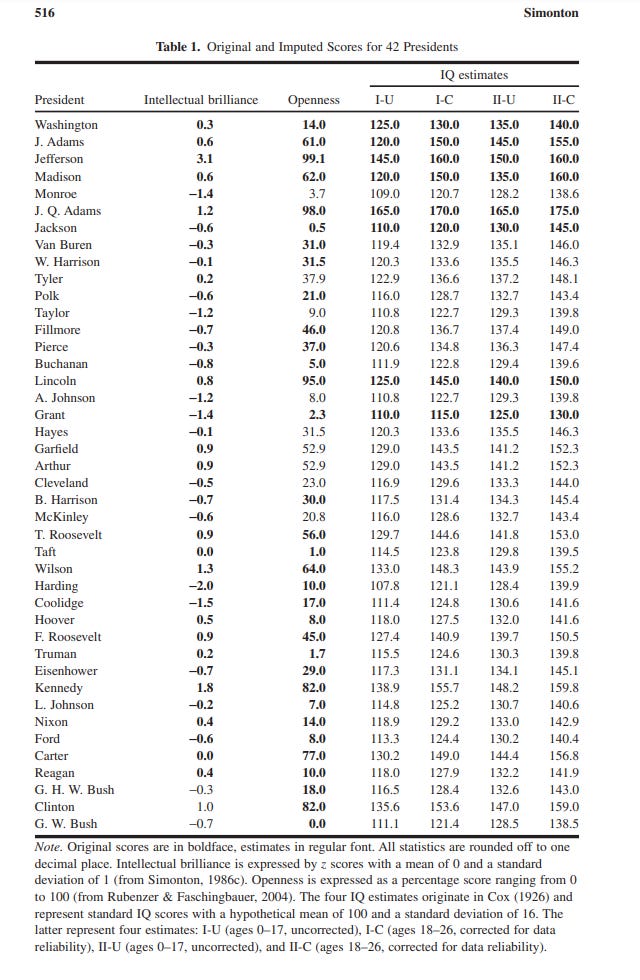For somebody to have an estimated IQ of 150, they have to score that well on an perfectly reliable IQ test, score even higher on a metric that imperfectly correlates with IQ, or an advanced regression/simulation method must be used.
In terms of well-known proxies for true IQ, the rank order is the following:
IQ test: reliability of 0.9 to 0.95
ACT/SAT scores: r = 0.75 to 0.85
GPA: r = 0.54 (uncorrected for artefacts) to 0.69 (full artefact correction)
Education: r = 0.5 to 0.6
Job performance: r = 0.3 to 0.6 (debated)
Occupational attainment: r = 0.3 to 0.5
Income: r = 0.15 to 0.4 (debated)
Net worth: r = 0.15 to 0.4 (debated)
Openness: r = 0.1 to 0.3
Emotional stability: r = 0.1 to 0.3
Schizophrenia: r = -0.25
Political beliefs: r = 0 to 0.4 depending on the belief
The only one of these variables that can measure IQs of above 150 is the IQ test, and only if it has a high enough ceiling.
In the case of schizophrenia, political beliefs, personality, net worth, occupational attainment, and income, there is way too little signal to reliably estimate IQs, especially in the upper range — the highest IQ profession in the Understanding Society sample was electrical engineers at 118 (n = 9); in others it’s usually lawyers, doctors, bookkeepers, or college professors at 120-130.
Assuming a correlation between job performance and IQ of 0.5, the most competent workers in the world would be expected to have an average IQ of 145, which is consistent with the observed average IQ of 150 or so that is seen in America’s greatest scientists.
In the case of education, the most educated person on paper would be some kind of STEM PhD from Harvard, probably in math, physics, or philosophy. I doubt those average at above 135; Ivy league undergrad students themselves average at about 120-130 or so and rumour has it that the grad students are less impressive than they are.
In the United States, about 2-5% of students obtain a roughly perfect GPA, but it is extremely difficult to get a good citation on this, as every single source confuses percentile with percentage (e.g. a B would be a ~50th percentile grade, but 83-88% percentage on a test). Assuming that a GPA of 4 corresponds to 2 standard deviations above the mean and the correlation between IQ and GPA is generously estimated to be 0.69, then students with a 4.0 GPA have IQs of about 125 on average.
> set.seed(1)
> g <- rnorm(60000000)
> gpa <- 0.69*g + rnorm(60000000)*sqrt(1-0.69^2)
> subby1 <- data.frame(gpa, g)
>
> subby2 <- subby1 %>% filter(gpa > 2)
> mean(subby2$g)*15
[1] 24.58179
> sd(subby2$g)*15
[1] 11.41152Even SAT and ACT scores that exhibit stronger correlations with IQ and have higher ceilings can only measure IQs of up to 142, assuming some regression to the mean (in this image, it’s r = 0.8).

The old SAT and GRE were able to estimate IQs beyond 150 because of their extremely high ceilings, otherwise it is not possible to do this without an IQ test or a regression method that uses multiple variables to estimate IQs.
And even then, the reliability of IQ tests tend to be lower at the upper ranges, as there are not enough difficult questions, so it would have to be a test that has both a high ceiling and g-loading.
Cox estimates
Many of the estimated IQ figures on the internet come from Cox, who estimated the average IQs of 300 geniuses in 1926, based on a reading of the individual’s biographies, letters, and anecdotes.

If an AI was trained to predict IQ scores from the same data that Cox used, I think that the IQs of historical figures could be estimated with decent accuracy. However, the issue here is that the estimates are based on intuition — it is easy for somebody to systematically overestimate or underestimate estimated IQs. Perhaps it is possible for a competent, well-trained person to estimate an individual’s IQ based on a reading of their biography and letters, but who knows if Cox is really that guy.
It’s difficult to empirically test how accurate the figures; all of these people are dead, and IQ tests cannot be administered to them. There is nonetheless reason to doubt them, if one parses out all of the philosophers from the list, the average IQ of them is 180 — a one in 20 million.
The same holds if you select the physicists.
Simonton estimates
Simonton has attempted to rank US presidents in terms of their intelligence, according to four different estimation methods that vary depending on whether they are based on data at the ages of 0-17 or 18-26 and whether they were corrected for data reliability.
I must note how discrepant these figures are from different estimation methods — Clinton’s estimate varies from 136 to 159, and Bush Jr’s varies from 111 to 138.
I have estimated the IQs of JFK and Nixon based on their performance in the Otis-Gamma test and school as well as the IQ of George Bush based on his performance on the SAT and a military entrance exam. I averaged all four methods Simonton used to generate an overall average.
We more or less agree on the IQ of George Bush, but the estimates of Nixon and JFK differ by 17 and 27 points respectively.







Voltaire at the same level as Newton, and JFK being way higher than Nixon, just comes off to me as unforgivable bias. JFK was a mediocre student while Nixon was a striver with a very good academic record. Voltaire is remembered mostly for empty platitudes today and is placed above much more influential philosophers with much broader areas of influence. And where the hell are Euler and Gauss?!
Kennedy being smarter than Johnson is laughable. There should be an "ugliness" modifier for presidents, where handsome presidents are assumed to have an unfair electoral advantage.